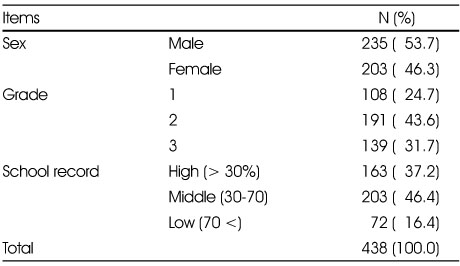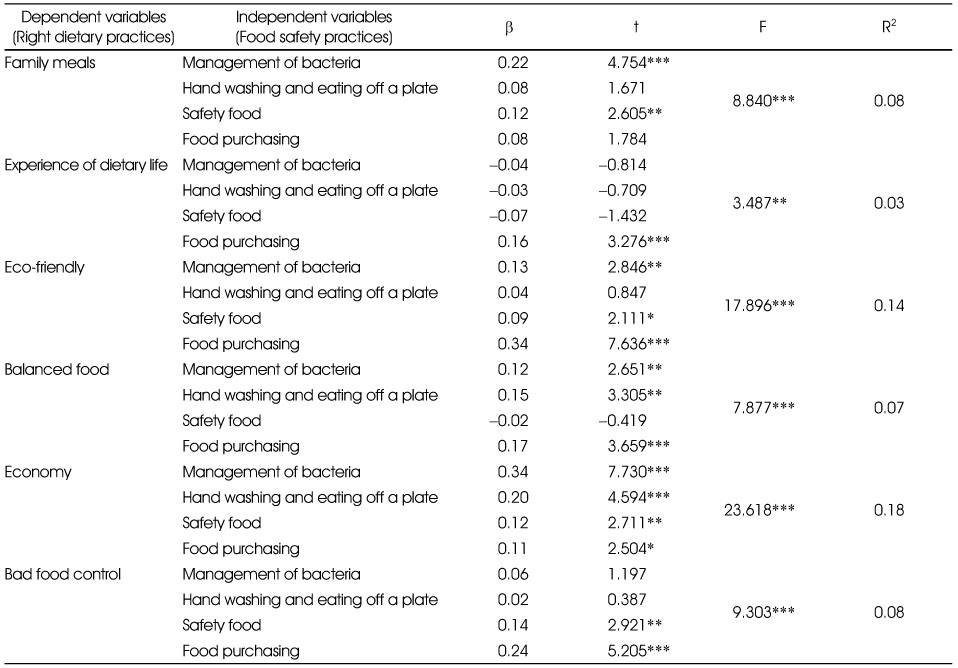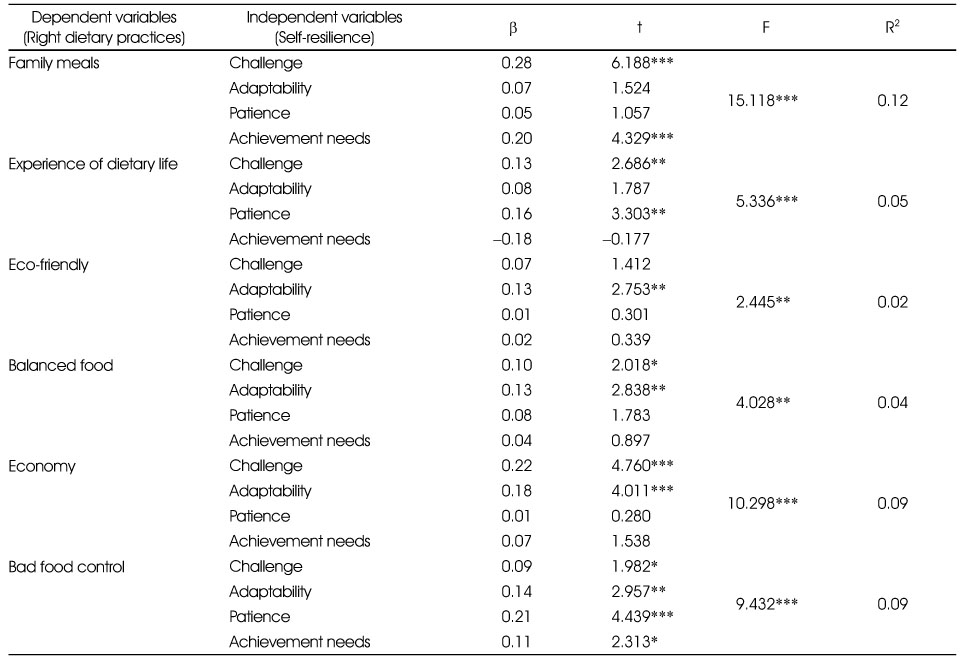References
1. Losasso C, Cibin V, Cappa V, Roccato A, Vanzo A, Andrighetto I. Food safety and nutrition: Improving consumer behaviour. Food Control 2012;26(2):252–258.
2. Kim MJ, Song SJ, Park SH, Song YJ. The association of snack consumption, lifestyle factors, and pediatric obesity with dietary behavior patterns in male adolescents. J Nutr Health 2015;48(3):228–235.
3. Cho HS, Kim MH, Choi MK. A study on vegetable intakes and dietary habits of middle school students in Chungnam. Korean J Community Nutr 2010;15(4):525–535.
4. Kim MH, Kim HY, Yeon JY. Comparative study on dietary habits, unbalanced diet and intake of food groups in middle school students-by gender and region-. J East Asian Soc Diet Life 2015;25(1):1–11.
5. Lim YS, Park NR, Jeon SB, Jeong SY, Tserendejid Z, Park HR. Analysis of weight control behaviors by body image perception among Korean women in different age group: using the 2010 Korea national health and nutrition examination survey data. Korean J Community Nutr 2015;20(2):141–150.
6. Shin SM. The association of unhealthy eating habit with students of high schools in Seoul. J Korean Soc Sch Health 2015;28(1):31–37.
7. Lee SH. Development and application of practical problem-based lesson plan for improving green dietary life. Korea Assoc Future Educ 2013;3(2):19–39.
8. Park CK. Effective response against unsanitary food crime. Korean Criminol Rev 2013;24(2):113–146.
9. Yoon JS, Kim HC, Kim MR. Analysis on knowledge, behaviors, and educational content need regarding green dietary life among middle school students in Daegu and Gyeongbuk region. J Korean Home Econ Educ Assoc 2013;25(4):13–27.
10. Kim ES, Cho HJ, Kim YH. A study of the relationship of green dietary education, self-esteem and happiness of middle school home economics students. J Korean Home Econ Educ Assoc 2015;27(3):63–77.
11. Ministry of Education. The course of education [internet] National Curriculum Information Center; 2013. cited 2015 Sep 15. Available from:
http://ncic.go.kr/.
12. Cheong HS, Lee HR. A study on the conditions of the nutrition educations and the perceptions of the nutrition teachers and dietitians in the primary and secondary schools in Gyeongnam area. J Basic Sci 2013;30(1):41–59.
13. Yang SJ, Chae JH, Yu NS, Park MJ. The analysis of duplicated contents of 'food and nutrition unit' of Home Economics and other subject textbooks for the middle school students. J Korean Home Econ Educ Assoc 2015;27(1):31–50.
14. Kim JN, Lim GH, Moon JY. The teacher's authority from the point of fusion. Philos Educ 2015;55(1):1–22.
15. Ministry for Agriculture Food and Rural Affairs. Right dietary [internet] 2010. cited 2013 Dec 10. Available from:
http://www.greentable.or.kr/.
16. Kim JH. Education of healthy living for eradicating unsanitary food In : Proceedings of 2013 Winter Conference of the Korean Home Economics Education Association; 2013 Nov 30; Gwangju. p. 55–75.
17. Jeon Ch. Research the improvement for cracking down on substandard food violations. J Korea Contents Assoc 2014;14(7):169–177.
18. Park SY, Lee CH, Nam MW, Cha SB, Park HJ, Chae KH. The effect of food safety e-learning content on educational achievement. Soc Korean Agric Hum Resour Dev 2009;41(3):41–62.
19. Block JH, Block J. The role of ego-control and ego-resiliency in the organization of behavior. In : Collins WA, ed. Minnesota symposia on child psychology Hillsdale, NJ: Erlbaum; 1980. p. 39–101.
20. Goo JE. Relationships between self-resilience, positive emotion, social support and adolescents' adjustment in family life · school life [master's thesis] Pusan National University; 2000.
21. Kim PM, Kim YH. An effect of self-perception toward healthrelated problem on the self-esteem of youth - Focusing on the moderating effect of ego-resilience. Korean J Youth Stud 2013;20(10):143–167.
22. Kim SA, Min KH. Comparison of three resilience scales and relationship between resilience and emotional characteristics. Korean J Soc Psychol 2011;25(2):223–243.
23. Haapala I, Probart C. Food safety knowledge, perceptions, and behaviors among middle school students. J Nutr Educ Behav 2004;36(2):71–76.
24. Brennan M, McCarthy M, Ritson C. Why do consumers deviate from best microbiological food safety advice? An examination of 'high-risk' consumers on the island of Ireland. Appetite 2007;49(2):405–418.
25. Wilson-Barlow L, Hollins TR, Clopton JR. Construction and validation of the healthy eating and weight self-efficacy (HEWSE) scale. Eat Behav 2014;15(3):490–492.
26. Fitzgerald A, Heary C, Kelly C, Nixon E, Shevlin M. Self-efficacy for healthy eating and peer support for unhealthy eating are associated with adolescents' food intake patterns. Appetite 2013;63(1):48–58.
27. Lee IW, Kim JH. Improvement of adolescents' obesity through physical activity and self-resilience program. J Korean Soc Sport policy 2013;11(1):45–55.
28. Barbero AH, López de Mesa MR, Azcona San Julián C. Influence of overweight on the health-related quality of life in adolescents. An Pediatr(Barc) 2015;82(3):131–138.
29. Min DI. A study of the effect of family strength and ego resilience upon adolescents' school adjustment [master's thesis] Inha National University; 2007.
30. Sanlier N. The knowledge and practice of food safety by young and adult consumers. Food Control 2009;20(6):538–542.
31. Nunnally JC. Assessment of Reliability 2nd edth ed. New York: McGraw-Hill; 1978.
32. Yru YS. A study on actual conditions and prevention of school violence. J Korean Teach Educ 2012;29(4):615–636.
33. Park MO. An analysis of implementing the volume-rate food waste disposal system in Korea: Focused on policy target group compliance. Korean Gov Rev 2015;22(1):161–194.
34. Seo SH, Ryu KM. Perception of foodborne illness prevention and personal hygiene practice. Korean J Food Cookery Sci 2008;24(3):294–303.
35. Shin JY. A study of the effect of parents' child-rearing attitude perceived by children on ego-resilience of students in middle school [master's thesis] 2004th ed. Catholic University of Daegu.
36. Strayer J, Roberts W. Children's empathy and role taking: child and parental factors, and relations to prosocial behavior. J Appl Dev Psychol 1989;10(2):227–239.
37. Kim NE. The relationships among stress, resilience, and quality of life in college students. J Adolesc Welf 2011;13(4):1–19.
38. Bae SH, Kim KS. The effects of the gratitude education program on the children's ego-resilience and learning attitude in elementary school students. Korean J Elementary Couns 2013;12(1):49–67.
39. Ewert A, Yoshino A. The influence of short-term adventurebased experiences on levels of resilience. J Adventure Educ Outdoor Learn 11(1):35–50.







